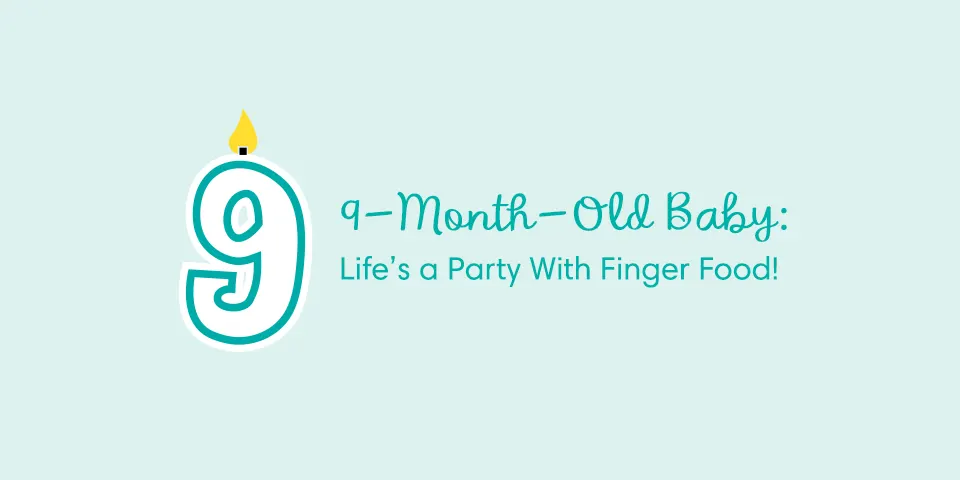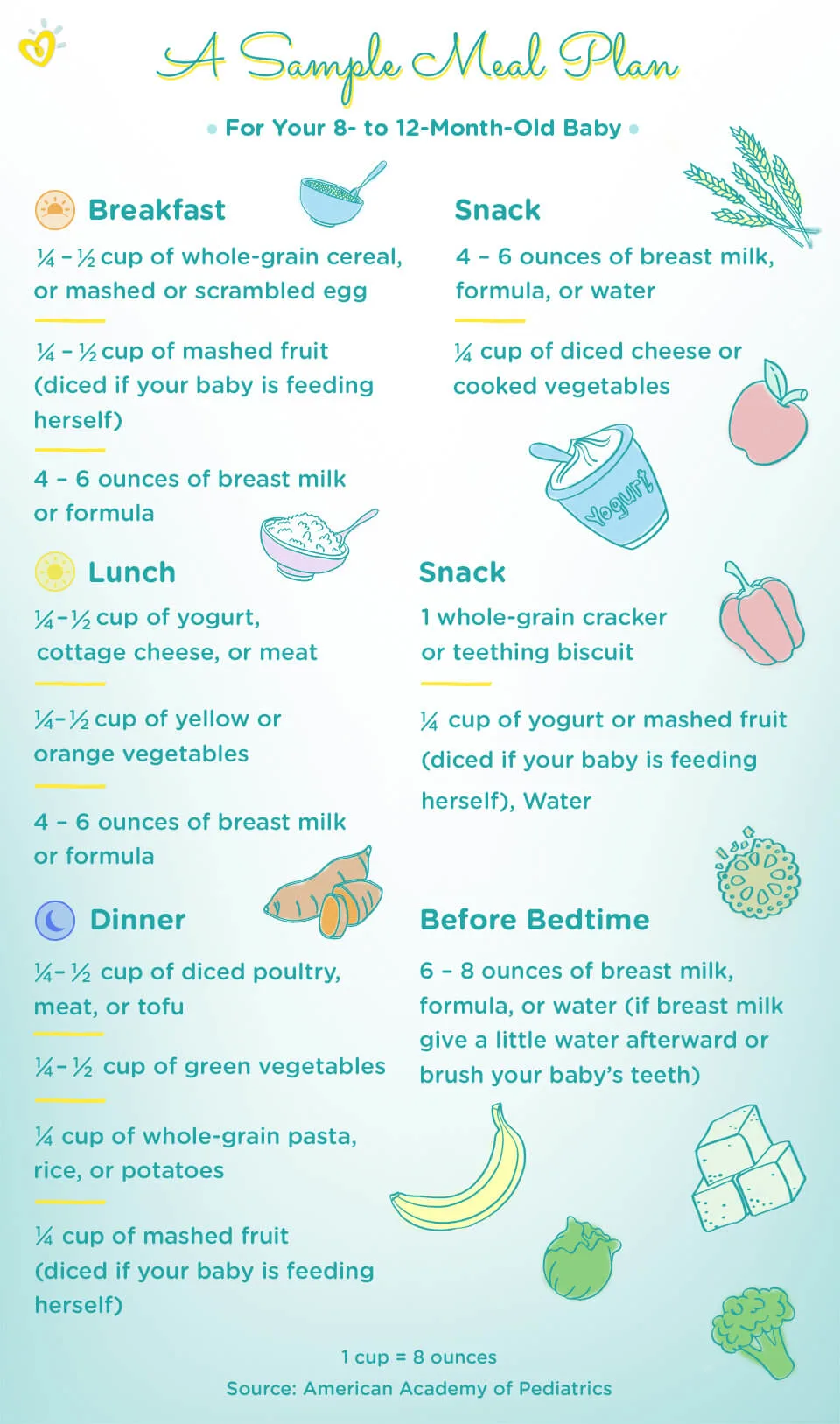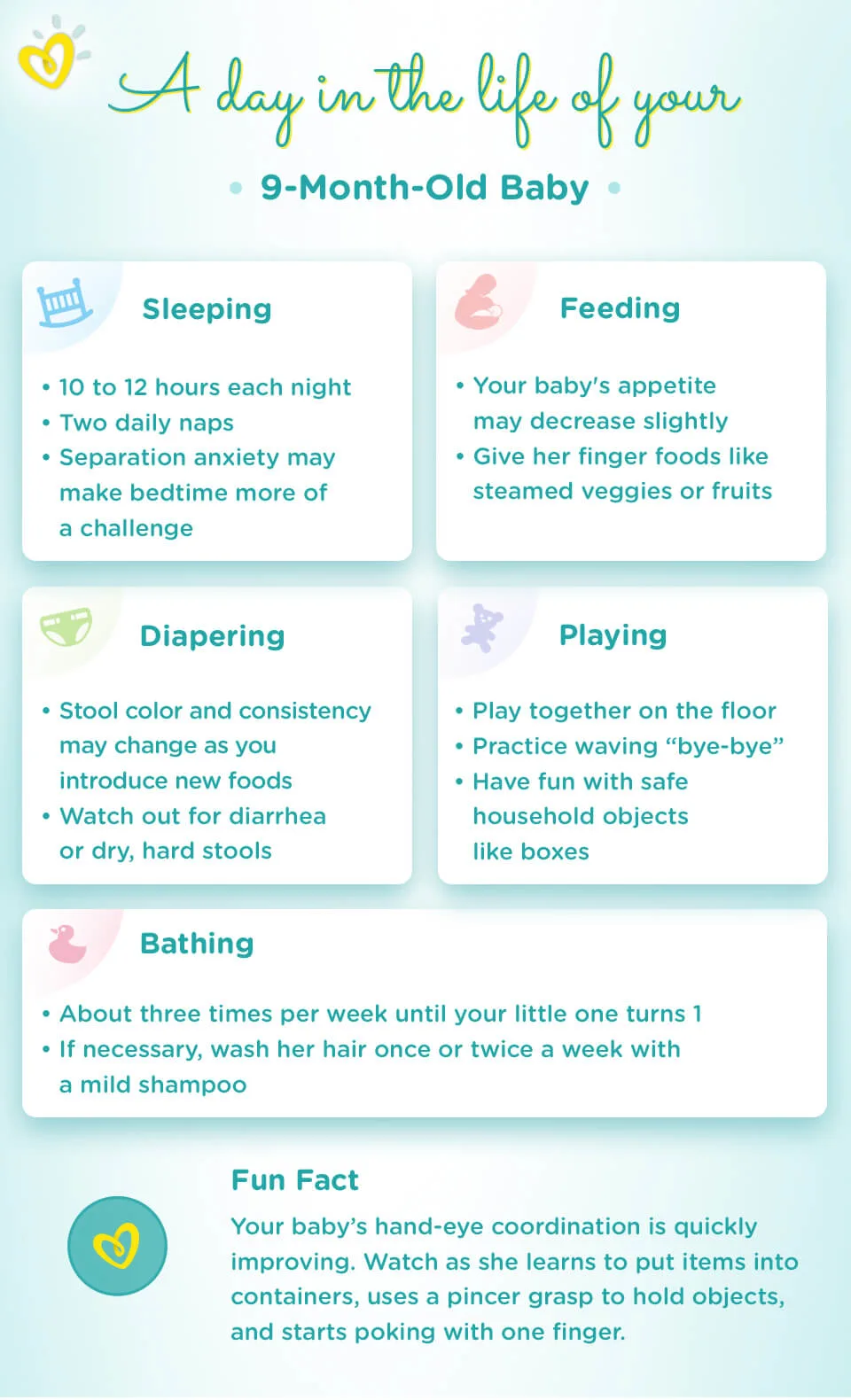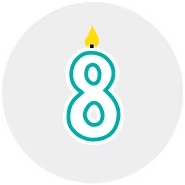9-month-old: Life’s a Party With Finger Food!
Your baby becomes more and more mobile (perhaps, she even crawls by now), and you cannot be prouder of the progress your little one is making. Many changes are happening this month, and these include improvements in your baby's ability to eat solid foods and the way she can now use her fingers. Read on to know more about the 9-month baby development milestones and the kinds of eating and sleeping habits you might experience at this stage.

Baby Development Milestones
So far, you might be aware of how much your baby enjoys playing with you! By now, you will have seen how she is growing and changing. Although there is no strict rule about 9-month-old baby milestones or activities for 9-month-old babies, here are some of the baby developmental milestones you might notice around this time:
Growth and Physical Development
At your next paediatrician's visit, your baby's doctor will track your 9-month-old baby's weight, height, and head circumference using the baby growth and milestone baby charts to make sure your baby's monthly growth is on track. Read more to find out how baby growth charts are used.
As your 9-month baby begins to stand, whether now or in the upcoming months, you may notice that her belly and bottom both stick out a little. Although this posture looks a little odd, it's absolutely normal for this baby growth stage. Your baby's alignment will correct itself when she's more confident at balancing, probably during her second year.
Senses: Let Your Baby Follow Her Nose
At 9-months-old, all of your baby's senses will help her learn more about her world. Introduce your little one to new and different scents to help her explore her sense of smell. You can let her smell flowers or fresh-cut grass when you go outside or take in the aromas of various foods, odours of objects and materials you find indoors. Keep in mind, any scent that you introduce is safe for her to smell.
Movement: Picking Up New Experiences!
By this time, your baby might be rolling onto her tummy from a seated position and getting back up again. These motions are strengthening her muscles to prepare her for being able to walk eventually. You may notice her crawling or doing something similar, like scooting on her bottom or slithering on her tummy. However, keep in mind that some babies skip crawling altogether, and others master it a little later on.
Your little one's hand and finger skills are getting better day by day. You will see that she has probably mastered the raking grasp as she tries to reach out and pull objects toward her. Now, she's working on developing the pincer movement or the pincer grasp, which is the ability to pick up and hold things between the thumb and forefinger. Although she isn't probably quite there yet, she has begun gaining better control of her fingers and hands while playing with objects and trying to feed herself. She'll be delighted to pick things up, shake them, bang them, and throw them, just to be amazed by the noise she makes as items crash to the floor. Hence, ensure that the stuff she plays with is safe and unbreakable.
Cognitive Development: Life's Simple Pleasures
Since your baby has a very short attention span, she may only be interested in playing with a toy for a couple of minutes before getting fascinating by some other object. This doesn't mean you need to buy brand-new toys for your 9-month-old baby, as she may be just as happy with basic household items, then be it a cereal box or a plastic tub. Remember, your baby may enjoy playing with things that are a little different from what she is familiar with. In fact, she might be frightened or overwhelmed if you give her something that is too new and different. For example, if your baby loves playing with a cereal box, add a ball in it or attach a string to it so that she can pull the box along.
Another thing that your baby might enjoy is the humble mirror. Although she may not have been able to recognise her own reflection over the past few months, now you may notice her reacting to her own reflection in a way that indicates she knows that it's her. You may notice that she grabs a strand of hair or try to rub something off her chin while looking in the mirror. Play with her in front of the mirror to reinforce this self-image. You can teach her about different parts of her body by naming them or telling her about different facial expressions by making faces.
By now, your baby can read the emotions on your face. So, it is best to keep strong negative emotions at bay. You can provide her with consistent and warm contact so that she feels secure and loved and not overwhelmed and upset.

How to Support Your Baby's Development
Following are some tips and strategies that can help promote your baby's healthy growth and development at this stage:
It is a good idea to spend some time on the floor playing with your baby. If your baby is already crawling, it is a fun idea to create obstacles with pillows, cushions, and boxes so that she can crawl over and between. For more fun, dangle an enticing object just beyond her reach to motivate her into crawling toward it.
Wait before helping your kid. We understand that knowing when to offer help to your child and when to let her figure out how to do something for herself is a tricky balance. Say, for example, she's playing with a toy, and it rolls under a pillow; will you help her get it out or let her try? If she seems frustrated, then you help her. But, if she takes it as a challenge and is adamant about retrieving it, then let her keep trying.
Give your baby safe toys with moving parts that change as she handles them to help improve her finger skills. These toys include stack like building blocks, push-pull toys like a little wooden train, or floating and squeezable bath toys like a rubber duck.
Let your baby meet other babies and their parents but be aware that she may feel uncomfortable around new people. So, give her some time to warm up to new people and situations.

Feeding Your 9-Month-Old Baby
Around the 9th month, about half of your baby's daily calories will mostly come from baby food while the rest coming from breast milk or formula.
During this month, your baby may be able to eat finger foods. So, you can give her small pieces of steamed vegetables or soft banana. You could also give her a small spoon of yoghurt so that she can try to put it in her mouth. Don't stress if much of the food ends up on the table or floor, as she isn't able to feed herself a complete meal just yet. Make sure to supervise your baby when she's trying to eat and avoid giving her big chunks of food, or any small hard foods, as she may swallow them without chewing, and it can lead to a choking hazard.
Here's an example of a daily menu for your baby that includes both 9-months baby food and breast milk or formula. This will also give you an approximate idea of the quantity of food to give your 9-month-old.

How Much Sleep Does a 9-Month-Old Baby Need?
9-month-old babies typically sleep for about 10 to 12 hours at night and nap twice during the day. These naps are usually during mid-morning and mid-afternoon. By now, your baby probably might not need a middle-of-the-night feed. However, she may wake up at night due to anxiety about where you are. You notice her sucking her thumb to cope or snuggling with a comfortable small blanket. If she cries, go to her, and reassure her that you are there with her and all is well. Make sure your baby is comfortable and not sick. If everything is well, avoid taking her to your bed or turning on the light. It is essential to reassure her calmly and consistently that you'll be there when she needs you and slowly teach her that she can sleep peacefully without worrying about your absence.

A Day in the Life of Your Baby
Usually, a 9-month-old baby's daily schedule mostly includes sleeping, feeding, bathing, and playing. So, here's an example of what a day in your baby's life might look like:

Your Baby's Health: Tips for Fun in the Sun
Sun protection is essential for your baby's skin. During summer, you may want to go outside with your baby, but remember, too much time in the sun can damage the skin. In fact, harmful UV rays can cause damage even during the winter, so it is important that you follow these sun protection tips year-round:
If possible, keep your baby out of direct sunlight between 10 a.m. and 4 p.m., as the sun is at its strongest.
Make sure your baby is wearing lightweight cotton clothes with long sleeves and long pants to cover much of the skin.
Use a beach umbrella to provide shade for your baby when playing outside or if in the stroller, pull the shade cover down during walks.
Ensure your baby is wearing a wide-brimmed hat.
Apply a good sunscreen with SPF 30 or higher on your baby's skin about half an hour before you go outside. Keep reapplying it after every two hours.
In case of a sunburn, place a cool washcloth on the affected area to ease the discomfort and then apply moisturiser on it.
Burns with blisters may require medical attention, so consult your baby's doctor for advice. Read more on treating sunburn.
Apart from skin care and sun protection, you may also want to know other common health concerns that may show up now or in the future:
Whooping cough
Whooping cough, also known as pertussis, is a bacterial infection that may lead to inflamed airways. It results in a severe cough that may have a whooping sound, particularly in older kids. As babies in their first year are at the greatest risk of whooping cough developing into something more severe, prompt medical care is a must. Contact your baby's doctor right away if you notice your baby with severe coughing that becomes exhausted after coughing. Keep track of your baby's health condition and if you notice shortness of breath, bluish lips or fingertips, or any drools or vomits after coughing, call your doctor. Make sure you strictly follow the doctor's treatment plan, keeping in mind that it may be a few weeks or even months before the cough disappears.
Middle ear infections
Some children may experience an ear infection by the time they are 2 years old. At 9-months-old, although your baby can't tell you with words about his hurting ear, she might show you in other ways. You may notice him cry during feedings, as sucking and swallowing cause pain in his middle ear. She may also find it difficult to sleep or may even develop a fever. You might notice some blood-tinged fluid or pus coming out from the infected ear, or she may not seem to hear as well. Although middle ear infections are most common during the winter, contact your baby's doctor if you suspect a problem. Your doctor will suggest a treatment plan that may include antibiotics. If your baby is prescribed antibiotics, make sure you adhere to the prescription, and your baby completes the whole course. Don't stop the medication even if your baby seems better.

FAQS AT A GLANCE
About half of your baby's daily calories need to come from breast milk or formula, and the rest can come from solids. You can introduce solid foods like:
- Pureed fruits and vegetables
- Small pieces of steamed veggies
- Small chunks of soft fruits such as banana
- Small pieces of whole-grain chapati
- Small pieces of chicken
- Scrambled eggs
- Whole grain cereals
- Yoghurt
- Oatmeal

Your Life as a Parent: How to Plan a Baby-Friendly Vacation
Are you considering a family vacation? Worry not if you are feeling anxious about travelling with your baby, as it is completely doable and fun! Here are some quick tips that can make your trip fun and easy:
Choose a relaxing and safe destination so that you don't feel overwhelmed. Going to a place you have been before and are feel comfortable with is the best option.
Avoid creating a jam-packed itinerary; instead, add lots of rest to your vacation plans.
Think about your baby's sleeping arrangement, whether you will be taking along a portable bed. It is best to let him sleep in it a few times before you leave for the vacation, as it will help him get used to it.
Try mimicking home in the best ways possible, whether following a similar daily routine or taking your baby's favourite toy along to make him comfortable.
Don't forget to pack lots of baby wipes as they're useful for cleaning your baby's hands and cheeks, as well as cleaning public places where you may have to change your baby's clothes or diapers.
Give this guide a read to know everything about packing your diaper bag. Pack extra clothes, diapers, snacks, and water. Check out the ultimate diaper bag checklist.
If you are flying, read this article for great tips on flying with an infant.
We understand that it is easier said than done but try to stay calm as much as you can. If you take on an easy-going attitude and you're having a good time, your baby will try to do the same.






